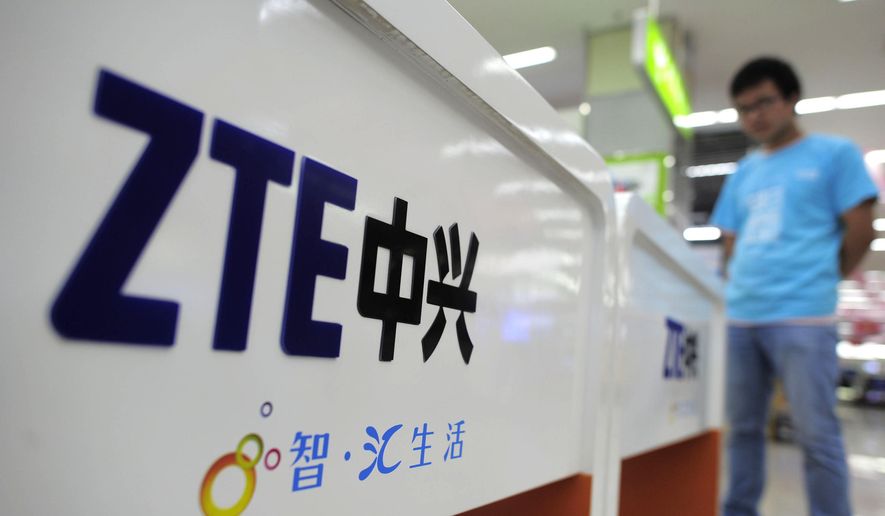The U.S.-China trade negotiations hit a speed bump Tuesday with President Trump saying he wasn’t happy with the progress and lawmakers moving to undercut his ability to lift a ban on Chinese telecom giant ZTE Corp., which has become a key bargaining chip.
Mr. Trump said he wanted a trade deal that was good for the U.S. and China but “it may not be possible.” He also bucked a report that he was nearing a deal to lift the ban on ZTE, saying there was no deal.
The report, which first appeared in The Wall Street Journal, spurred lawmakers from both parties to accuse Mr. Trump of being duped by Chinese President Xi Jinping and of putting U.S. national security at risk.
The new uncertainty about trade talks, coupled with Mr. Trump raising doubts about a nuke summit with North Korea, gave Wall Street the jitters.
The Dow Jones Industrial Averaged shedded more than 170 points and dropped bellow 25,000. It was a dizzying reversal from the previous day when a breakthrough in the trade talks, including China agreeing in principle to buy more U.S. good, sent the Dow soaring more than 300 points and topping 25,000 for the first time since March.
“I’m not satisfied, but we’ll see what happens. We have a long way to go,” Mr. Trump said of his push to trim America’s annual $375 billion trade deficit with China.
SEE ALSO: Senate curbs Donald Trump’s ability to ease sanctions on Chinese telecom giant ZTE
He struck the dour tone even as China announced it was reducing tariffs on imported cars and car parts, a concession to one of Mr. Trump’s demands.
China’s Trade Ministry said it was slashing tariffs on cars to 15 percent of wholesale value from 25 percent and on auto parts to 6 percent from rates that currently range from 8 percent to 20 percent. Mr. Trump often pointed to the disparate tariffs on cars — the U.S. has a 2 percent tariff — as evidence of China’s unfair trade practices.
Meanwhile, the backlash from a possible deal to lift the ban on ZTE went from harsh criticism of Mr. Trump’s negotiating skills to legislation to block him from doing it.
The Commerce Department blacklisted ZTE, the second-largest manufacturer of cellphones in China, from doing business with the U.S. because the firm failed to comply with a settlement reached after it violated sanctions against North Korea and Iran. The Pentagon previously banned the phones on military bases because of security concerns, namely that the phones could be used for spying by the Chinese government.
In a 32-2 vote, the Senate Banking Committee advanced legislation Tuesday that limited the president’s ability to ease sanctions on Chinese telecom companies, requiring the administration first prove to Congress that the company is complying with U.S. law.
“We know ZTE is a repeated and flagrant violator of U.S. laws — there’s absolutely no question of their culpability. Yet the President of the United States is fighting to protect jobs in China at a company that may be spying on Americans and has been sanctioned by our government,” said Sen. Chris Van Hollen, a Maryland Democrat to wrote the legislation.
He said the situation was “deeply troubling, regardless of your political party.”
Sen. Marco Rubio, Florida Republican, said the Trump administration was being conned.
“Sadly #China is out-negotiating the administration & winning the trade talks right now. They have avoided tariffs & got a #ZTE deal without giving up anything meaningful in return by using N. Korea talks & agriculture issues as leverage,” he tweeted.
Mr. Trump this month ordered a review of the ZTE ban in response to a personal request by Mr. Xi, who said the ban was risking 70,000 jobs.
The deal appeared key to the larger trade talks, although the administration insisted that was not the case.
Treasury Secretary Steven T. Mnuchin, in testimony before a Senate appropriations subcommittee on finance, said that any deal considered on ZTE “will take into account the very important national security issues, and those will be addressed.”
He did not confirm that a deal was in the works. But he said that the sanctions were not intended to bankrupt the Chinese firm, which depends on U.S. suppliers.
Mr. Trump gave a mixed message. “There is no deal. We will see what happens,” said Mr. Trump told reporters at a meeting with South Korean President Moon Jae-in. However, he later noted that U.S. firms supply ZTE and were hurt by the ban too and “don’t think we didn’t hear from them.”
He also said that he could “envision” a deal where ZTE got a fined as much as $1.3 billion, had to replace its board of directors and agree to purchase most components from American firms.
The terms he described were identical to deal described in the newspaper report.
Senate Minority Leader Charles E. Schumer said the new penalties on ZTE were like a “wet noodle.”
“The Art of the Deal? It should be President Xi that writes the book because he’s taken us to the cleaners on ZTE,” the New York Democrat said in a speech to the Senate, referring to Mr. Trump’s book on dealmaking.
White House press secretary Sarah Huckabee Sanders brushed off the critique.
“Sen. Schumer is not somebody this White House is probably ever going to take advice from on how to negotiate or get a good deal on anything, particularly based on his track record,” she said.
• Dan Boylan contributed to this article.
• S.A. Miller can be reached at smiller@washingtontimes.com.




Please read our comment policy before commenting.